
On Wednesday, the price of oil declined, after Saudi Arabia and the United Arab Emirates announced their plans to increase production, despite the OPEC and the US Energy Information Administration (EIA) predicting a decrease in demand for oil due to the coronavirus.
As a result, Brent fell by $1.03, almost 2.8%, and amounted to $36.19 per barrel, while the West Texas Intermediate (WTI) fell by 99 cents, or 2.9%, and amounted to $33.37.
Following the OPEC's disagreement with Saudi Arabia, oil company Saudi Aramco received an order from the Ministry of Energy to increase production from 12 million barrels per day to 13 million.
At the same time, UAE's Abu Dhabi National Oil Company (ADNOC) also announced that it will increase crude oil supplies to more than 4 million barrels per day, and increase its production to 5 million barrels per day for the month of April.
"The shocking strategy of Saudi Arabia tells us that in order to bring Russia back to the negotiating table, serious pain in the price and income for all oil producers will entail," UBS analysts note that "the increase in oil reserves will likely affect the prices in the coming months."
Alexander Novak, Russia's Minister of Energy, said that Moscow had received several phone calls from both OPEC and non-OPEC countries, and none of the partners agreed with Saudi's proposal to increase production capacity. Novak said that the suggested action was "probably not the best option."
Meanwhile, the Organization of the Petroleum Exporting Countries (OPEC) said in its monthly report that it expects global demand to grow by 60,000 barrels per day in 2020, while the US Energy Information Administration (EIA) expects a decline of 910,000 barrels per day in the first quarter of 2020, due to the coronavirus outbreak.
Today, the main OPEC oil producers, Kuwait, Iraq, and UAE, joined Saudi Arabia in reducing the oil prices.
Based on the news, oil slipped by another $3:






















